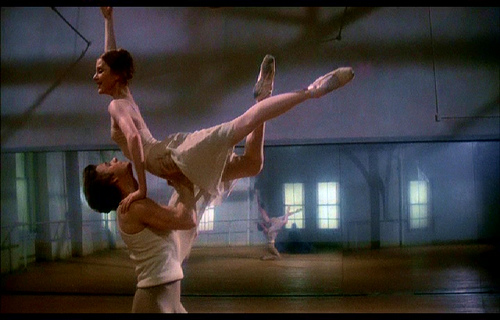Let me start this off by saying that I am not a hippy. I love the earth as much as the next guy, but saving the planet isn't at the top of my priorities. I'll can easily say its selfish of me, but I do a small part and I hope it makes a large enough impact to matter in the long run. I'll admit that being a dancer from north, central Florida who loves her air conditioner, that I'm not willing to give up my creature comforts for the whole of the environment, but doing small things can help everyone and our future generations awareness to the ever growing problems.
We've all heard about global warming and about not leaving the earth polluted for the generations to come, but how much can we really help out with as dancers? A lot of dancers first approach would be to create pieces to raise the awareness of the world and hopefully change how we live. The piece
Future of Tomorrow was based entirely on the environment and was widely received as an awe inspiring look into our planets true face. I will say that these pieces have noble intentions and really make themselves a statement, but what did they really do to help the environment? Most of the people who follow the dance community already care about the world around them. How could they have really helped in the long run?
Well lets look at how most dancers attend class and some simple, easy changes that can really help out in the long run. First of all lets talk about your hydration system. Are you still using disposable water battles? Shame on you! Did you know that it takes 17 million barrels of oil to make these water bottles? Which is enough to run 100,000 cars for a year, according to the Pacific Institute. Wow, what an impact on our earth! Not to mention that 70 to 80 percent of the 34.6 billion plastic water bottles Americans buy each year end up in a landfill or incinerate and millions of gallons are used in manufacturing the bottles and that two gallons of water are wasted for every one gallon that goes into the bottles through the purification process. Opt for a
metal water bottle instead. They're quite stylish and re-washable too!
Now here a simple one that might even make mom happy, carpooling. Although its not always feasible and sometimes its down right impossible, carpooling really helps cut down on the carbon dioxide put into the atmosphere and could help create stronger friendships in the process. For every gallon of gas your car consumes, it creates 20 pounds of carbon dioxide which contributes to global warming. The average car emits about six tons of carbon dioxide every year according to Julia Wang of
TerraPass. Thats a lot of crap we have to breathe in everyday! Carpooling and walking to and from dance can really help cut those numbers down.
Now lets look at our clothes for just a minute. Look at the label of your leotard and tights. You'll probably see its made out of a blend of Nylon, Spandex and Lycra. How does that effect our environment? Well its simple, they're made from
plastic. Plastic takes forever and a life time to degrade and is only recyclable once in its life time. Not to mention all the chemicals that were used to forge that striking halter leo you're sporting these days. Unfortunately its not really as simple as just wearing 100% cotton either. According to the
Organic Consumers Association, it takes one-third of a pound of agricultural chemicals to produce one cotton shirt in the United States. That roughly means that your
100% Cotton Leotard is actually about 73% cotton and 27% chemicals. So whats a trendy, environmentally aware dancer to do? Its simple really, buy used leotards. I know some of us cringe at the thought of wearing a leotard someone else has danced in but its really the best way to help out. (You may notice I only said leotards here, thats simply because wearing used tights in disgusting and would be like wearing used underwear. Ew)
However, if you still aren't comfortable with buying used, just try to buy a leotard with the highest amount of cotton available in it.
This is a good example. Stylish yet breathable, what more could you ask for? There are also some interesting options for shoes now a days. Finding
shoes made from vegetable dye instead of complete nylon is an amazing feat of human technology, in my opinion!
However you decide to help the environment helps out in the long run. Remember that it won't be our planet forever and only we can make the change!
What would you like to hear about next, my lovelies? Leave me a comment or message my facebook. -Ms Ivy












